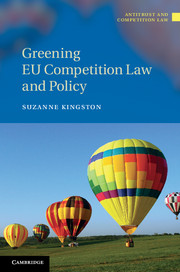Book contents
- Frontmatter
- Contents
- Foreword
- Acknowledgements
- Abbreviations
- Introduction
- Part I Should environmental goals play a role in EU competition law and policy?
- 1 Environmental protection in EU competition theory to date
- 2 The rise of the market in EU environmental policy
- 3 Why environmental protection goals should play a role in EU competition policy: a legal systematic argument
- 4 Why environmental protection goals should play a role in EU competition policy: a governance argument
- 5 Why environmental protection goals should play a role in EU competition policy: an economic argument
- Part II The role of environmental protection in EU competition law and policy in practice
- Part III Conclusions
- Select bibliography
- Index
- References
2 - The rise of the market in EU environmental policy
from Part I - Should environmental goals play a role in EU competition law and policy?
Published online by Cambridge University Press: 05 November 2011
- Frontmatter
- Contents
- Foreword
- Acknowledgements
- Abbreviations
- Introduction
- Part I Should environmental goals play a role in EU competition law and policy?
- 1 Environmental protection in EU competition theory to date
- 2 The rise of the market in EU environmental policy
- 3 Why environmental protection goals should play a role in EU competition policy: a legal systematic argument
- 4 Why environmental protection goals should play a role in EU competition policy: a governance argument
- 5 Why environmental protection goals should play a role in EU competition policy: an economic argument
- Part II The role of environmental protection in EU competition law and policy in practice
- Part III Conclusions
- Select bibliography
- Index
- References
Summary
Introduction
One of the most striking developments in EU environmental policy since its beginnings has been the transformation in regulatory instruments used. From an initially almost exclusive focus on direct, command and control regulation, a radical, though gradual, shift has occurred whereby market-based instruments, which use market mechanisms to achieve environmental aims, now play a vital role in the EU's regulatory mix. At its heart, this change reflects the ideological shift that had taken place under Reagan in the US, and Thatcher in the UK, towards neo-liberalism and belief that free market values should apply throughout not only economic, but also social, political and environmental life. While traditional direct regulation remains important within the EU, the use of market-based instruments is being considered in increasingly wide areas of EU environmental policy, including areas such as habitat conservation where it was formerly thought inappropriate.
The shift towards market-based instruments has important implications for the interface between EU environmental and competition policy, bringing large areas of environmental policy within the scope of competition law for the first time. It is as a result of this shift, therefore, that competition enforcers will increasingly be forced to consider their approach to environmental considerations. Understanding the extent of this change is, in sum, crucial to an appreciation of how the EU's environmental and competition policies interact at present, and will interact in the future.
- Type
- Chapter
- Information
- Greening EU Competition Law and Policy , pp. 41 - 96Publisher: Cambridge University PressPrint publication year: 2011

